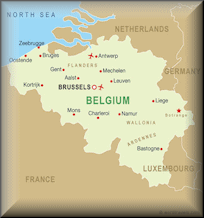-
-

Please Wait...
-
.be Belgian Domain Country Information - .be Belgium Country Information
.be

Price and Requirements for .be Domains
Registration Pricing
- 1 Year 9.99 USD
Application Fee
Registration Time Frame
Instant
Requirements
Yes Details Are Individual .be domain registrations allowed?
Yes Details Company or legal entities registrations allowed for .be?
No Details Are there requirements, documents, or information needed for .be?
Yes Details Are some .be domain names restricted?
No Details Does .be domain have a special use?
No Details Other information I need to know about .be?
No Details Are there any additional fees for .be?
No Details Do I need a trademark/brand name to register .be?
No Details WHOIS Privacy service available?
![]() Trustee / Proxy service offered? Fees?
No
Details
Trustee / Proxy service offered? Fees?
No
Details
.be Belgium Country Information
Belgium, officially the Kingdom of Belgium, is a federal state in Western Europe. It is a founding member of the European Union and hosts the EU's headquarters, and those of several other major international organisations such as NATO. Belgium covers an area of 30,528 square kilometres (11,787 sq mi), and it has a population of about 11 million people. Straddling the cultural boundary between Germanic and Latin Europe, Belgium is home to two main linguistic groups, the Dutch-speakers, mostly Flemish (about 60%), and the French-speakers, mostly Walloons (about 40%), plus a small group of German-speakers. Belgium's two largest regions are the Dutch-speaking region of Flanders in the north and the French-speaking southern region of Wallonia. The Brussels-Capital Region, officially bilingual, is a mostly French-speaking enclave within the Flemish Region. A German-speaking Community exists in eastern Wallonia. Belgium's linguistic diversity and related political conflicts are reflected in the political history and a complex system of government.
Historically, Belgium, the Netherlands and Luxembourg were known as the Low Countries, which used to cover a somewhat larger area than the current Benelux group of states. The region was called Belgica in Latin because of the Roman province Gallia Belgica which covered more or less the same area. From the end of the Middle Ages until the 17th century, it was a prosperous centre of commerce and culture. From the 16th century until the Belgian Revolution in 1830, when Belgium seceded from the Netherlands, many battles between European powers were fought in the area of Belgium, causing it to be dubbed the battleground of Europe, a reputation strengthened by both World Wars.
Upon its independence, Belgium participated in the Industrial Revolution and, during the course of the 20th century, possessed a number of colonies in Africa. The second half of the 20th century was marked by the rise of non-violent conflicts between the Flemish and the Francophones fuelled by cultural differences on the one hand and an asymmetrical economic evolution of Flanders and Wallonia on the other hand. These ongoing conflicts have caused far-reaching reforms of the formerly unitary Belgian state into a federal state which may lead to a complete partition of the country in the future.
The name 'Belgium' is derived from Gallia Belgica, a Roman province in the northernmost part of Gaul that, before Roman invasion in 100 BC, was inhabited by the Belgae, a mix of Celtic and Germanic peoples. A gradual immigration by Germanic Frankish tribes during the 5th century brought the area under the rule of the Merovingian kings. A gradual shift of power during the 8th century led the kingdom of the Franks to evolve into the Carolingian Empire. The Treaty of Verdun in 843 divided the region into Middle and West Francia and therefore into a set of more or less independent fiefdoms which, during the Middle Ages, were vassals either of the King of France or of the Holy Roman Emperor.
Many of these fiefdoms were united in the Burgundian Netherlands of the 14th and 15th centuries. Emperor Charles V extended the personal union of the Seventeen Provinces in the 1540s, making it far more than a personal union by the Pragmatic Sanction of 1549 and increased his influence over the Prince-Bishopric of Liège. The Eighty Years' War (1568–1648) divided the Low Countries into the northern United Provinces (Belgica Foederata in Latin, the "Federated Netherlands") and the Southern Netherlands (Belgica Regia, the "Royal Netherlands"). The latter were ruled successively by the Spanish and the Austrian Habsburgs and comprised most of modern Belgium. This was the theatre of most Franco-Spanish and Franco-Austrian wars during the 17th and 18th centuries. Following the campaigns of 1794 in the French Revolutionary Wars, the Low Countries—including territories that were never nominally under Habsburg rule, such as the Prince-Bishopric of Liège—were annexed by the French First Republic, ending Austrian rule in the region. The reunification of the Low Countries as the United Kingdom of the Netherlands occurred at the dissolution of the First French Empire in 1815.
The 1830 Belgian Revolution led to the establishment of a Catholic and bourgeois, officially French-speaking and neutral, independent Belgium under a provisional government and a national congress.Since the installation of Leopold I as king on 21 July 1831 (which now celebrated as Belgium's National Day), Belgium has been a constitutional monarchy and parliamentary democracy, with a laicist constitution based on the Napoleonic code. Although the franchise was initially restricted, universal suffrage for men was introduced after the general strike of 1893 (with plural voting until 1919) and for women in 1949.
.be Belgium Domain Name - Country Information
| Country Domain | Belgium Domain Name .be |
|---|---|
| Country Information | Belgium Domain Country Information .be |
| TLD Bulk & Advanced Search | Belgium Bulk Domain Registration .be |
| WhoIs Server | .be Whois Server Information |
| Domain Renewals | Renewal Belgian Domain .be |
| Domain Transfer | Transfer Domain .be |
| Domain Hosting | .be Belgium Web Hosting |
| SSL Certificates | SSL Certificates |
| Email Services | .be Belgium Email Services |
| Domain FAQ | .be Domain Registration FAQ |
Belgium Country Information Search Terms
Belgian Domain Country Information Belgian Domain Registrar Belgian World Wide Domain Registration Belgian Country Code Top Level Domain .be Domain Information Belgian Country Information Belgium Country Information












